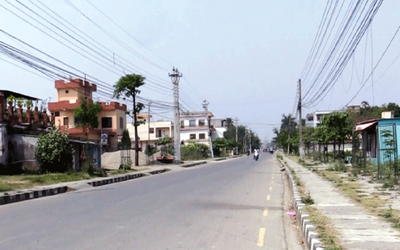I was on my way back home when I overheard two people talking inside the overly stuffed Safa Tempo. From what I gathered, they came to Kathmandu after celebrating the Dashain festival in their homes outside the valley.,One was new to the city. So, the other was explaining to the newcomer how he had to be on time at work which started at 6 every morning. He was giving directions as to how to get to a particular place in the city. More or less, it was a one-sided conversation in which the listener merely nodded and grunted or groaned on the bumpy road.
It then occurred to me how many young people like him came to the city to find jobs and accommodation only to be disappointed by the city, so unwelcoming and unmanaged. The valley is home to nearly 4 million people, who have learnt the hard way to shut up and live with whatever meager supply of water, electricity, road, education and job opportunity was available. And while the new entrants initially struggled to fit into the failed city, they make it a routine to do so in the longer run.
Centralization is a major culprit in all this. The policies were made in the center, and proper actions to incorporate more people never happened. This resulted in an unplanned city, hosting clustered and haphazard houses, narrow gallies and roads, and lack of everything from drinking water, petrol to sidewalk space. Despite unplanned clusters, skyrocketing price of Dera Bhada and the unfriendly attitude of Gharpatis, the commoners have no other choice than to continue their lives in the city. The city evolved into what it is and what remains from its past is only the reminiscences of the older generations.
This act of centralization again failed to provide any opportunity to people outside the capital. They had, and still have, nothing in their hands and around them which tallies with what they heard from their relatives elsewhere. They then make their way into the capital again to be frustrated by the lack of hospitality the city offers. However, they have no other choice than to come to the capital, be it for better medical treatment, better education or a case hearing in the Supreme Court.
In all its efforts to be hospitable, the capital fails. With a very disgruntled political people and an unsatisfactory political chaos, the citizensbecome the poor victims. Every strike, political or otherwise, does nothing to improve the already very weak daily situation of commoners. Rise in prices to unavailability of transport pose as problems not to mention closed education institutions and another day of grueling walking to office.
In their run to be above each other, these politicos do not realize or perhaps neglect the everyday problems faced by the normal people. Had not it been so, there would have been loads of improvement on drinking water, roads and electricity problems. It is just because we are docile that load shedding is a solved solution. Had the population been somewhat aggressive and able to force the authorities to improve the services, we would not have been living in a failed democratic system. The same - applies in case of dumping waste and sewage into rivers in the city, another aspect of a failed management. Thanks to mismanagement in the municipalities, strikes or otherwise, solid wastes remain on the major streets for days, further aggravating health and sanitation of the city dwellers.
The traffic is again as haphazard as the unplanned concrete mass flourishing in the city. The array of vehicles makes a commute very difficult. Though private vehicle owners show some sensibleness, the public vehicle drivers and conductors show no mercy to other road users or any respect to the traffic rule enforcers. The same goes for the pedestrians, crossing the streets or walking on the wrong side just as they want to; the stray animals know to stick to their side!
These glimpses of a city so densely populated and congested do not reflect anything more than a city that failed to receive nurture as it required. A city people piled up their dreams on, but the ones in power never made appropriate steps to let them fulfill their dreams. The ones who could get away did so a long time back, and those remaining here dwell and depend upon their faded Kathmandu dreams, hoping and believing them to be true some time.
I recall a tourist telling me at the departure lounge in Tribhuvan International Airport a couple of years back, “Your city is so beautiful, but it is so badly managed, I felt like I was walking through the open sewage.” Is anyone in the political circles listening and getting serious about strengthening the municipalities with people’s representatives?
- TANAHU HYDROPOWER PROEJCT: A Significant Achievement
- Apr 15, 2024
- AMBASSADOR HANAN GODAR: Sharing Pain With A Nepali Family
- Mar 30, 2024
- VISIT OF KfW AND EIB TO NEPAL : Mission Matters
- Mar 25, 2024
- NEPAL BRITAIN SOCIETY: Pratima Pande's Leadership
- Mar 24, 2024
- NEPAL ARMY DAY: Time To Recall Glory
- Mar 15, 2024
















